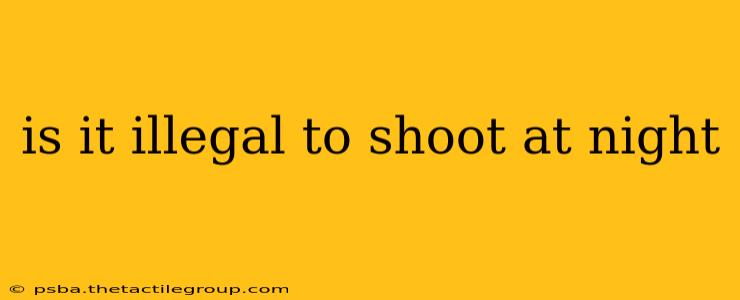Is It Illegal to Shoot at Night? A Comprehensive Guide to Nighttime Firearms Laws
The legality of shooting at night is far from a simple yes or no answer. It's a complex issue governed by a patchwork of federal, state, and even local ordinances, making a definitive statement impossible without specifying a precise location. This guide will explore the key factors determining the legality of nighttime shooting, helping you understand the potential risks and responsibilities involved.
Key Factors Affecting the Legality of Night Shooting
Several crucial factors determine whether discharging a firearm at night is legal in your area:
-
Location: This is paramount. Laws vary drastically depending on whether you're in a densely populated urban area, a sparsely populated rural area, on private property, or on public land. City ordinances often place stricter restrictions on firearm discharge than rural counties. Shooting ranges, while providing a controlled environment, often have specific nighttime operating hours and regulations.
-
Type of Firearm: Handguns, rifles, and shotguns may be subject to different regulations, particularly concerning their use at night. The type of ammunition used also plays a role; some ammunition is more prone to causing noise pollution or presenting safety hazards at night.
-
Purpose of Shooting: The reason for firing a firearm is a significant factor. Self-defense, hunting (with the proper license and during legal hunting seasons), pest control, and target practice are all treated differently under the law. Recreational shooting, even on private land, may still be restricted depending on your location and local noise ordinances.
-
Safety Precautions: The lack of sufficient light at night significantly increases the risk of accidental injury or property damage. Local regulations often mandate specific safety precautions, such as the use of backstops, safe distances from structures, and the presence of responsible supervision. Failure to adhere to these safety regulations can lead to legal repercussions regardless of whether the shooting itself is technically legal.
-
State and Local Ordinances: It's crucial to consult your state's specific laws and any local ordinances within your county or municipality. Many jurisdictions have explicit laws regarding nighttime firearm discharge, often with more stringent restrictions than daytime regulations. These laws might dictate specific hours when shooting is prohibited, require permits, or impose penalties for violations.
Understanding the Potential Consequences
Violating nighttime firearm discharge laws can result in a range of penalties, including:
- Fines: Significant monetary fines are a common consequence.
- Jail Time: Depending on the severity of the violation and local laws, jail time is a possibility.
- Loss of Hunting or Firearms Licenses: This can significantly impact your ability to engage in activities involving firearms in the future.
- Civil Lawsuits: If your actions result in injury or property damage, you could face civil lawsuits with significant financial implications.
How to Determine the Legality in Your Area
To ascertain the legality of shooting at night in your specific location, consult the following resources:
- Your State's Department of Natural Resources or Fish and Wildlife Agency: These agencies often regulate hunting and firearm use.
- Your Local Law Enforcement Agency: Contact your local police department or sheriff's office for clarification on local ordinances.
- Your County or City's Official Website: Many local governments post their ordinances online.
- A Qualified Legal Professional: Consulting an attorney specializing in firearms law is highly recommended for any legal questions regarding firearm use.
Disclaimer: This information is for educational purposes only and does not constitute legal advice. Always consult with the appropriate authorities and legal professionals before engaging in any activity involving firearms. Failure to comply with all applicable laws and regulations can lead to serious consequences.

